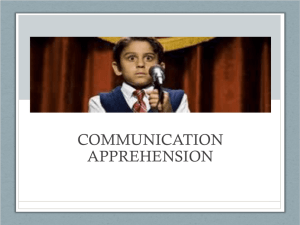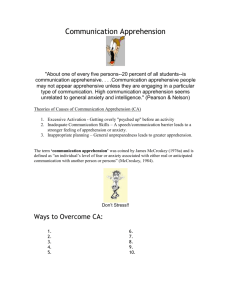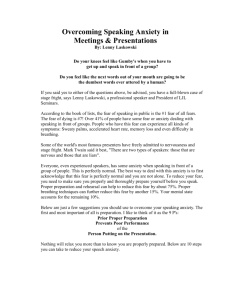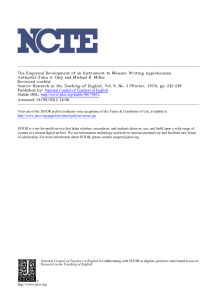Common Causes of Apprehension
advertisement
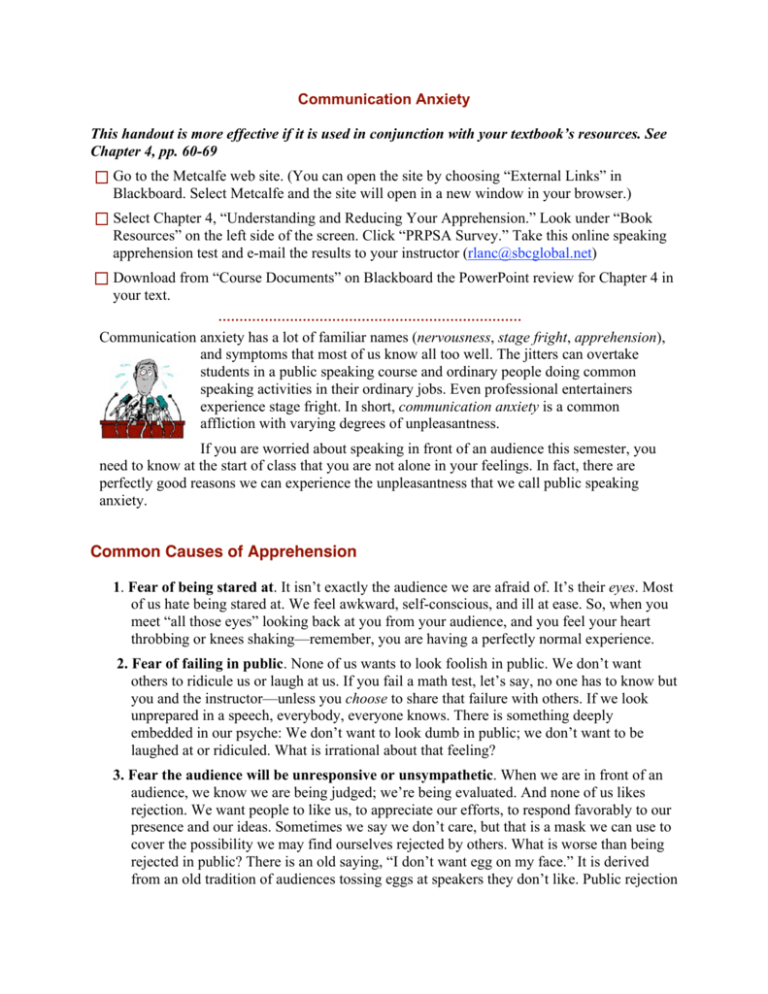
Communication Anxiety This handout is more effective if it is used in conjunction with your textbook’s resources. See Chapter 4, pp. 60-69 Go to the Metcalfe web site. (You can open the site by choosing “External Links” in Blackboard. Select Metcalfe and the site will open in a new window in your browser.) Select Chapter 4, “Understanding and Reducing Your Apprehension.” Look under “Book Resources” on the left side of the screen. Click “PRPSA Survey.” Take this online speaking apprehension test and e-mail the results to your instructor (rlanc@sbcglobal.net) Download from “Course Documents” on Blackboard the PowerPoint review for Chapter 4 in your text. Communication anxiety has a lot of familiar names (nervousness, stage fright, apprehension), and symptoms that most of us know all too well. The jitters can overtake students in a public speaking course and ordinary people doing common speaking activities in their ordinary jobs. Even professional entertainers experience stage fright. In short, communication anxiety is a common affliction with varying degrees of unpleasantness. If you are worried about speaking in front of an audience this semester, you need to know at the start of class that you are not alone in your feelings. In fact, there are perfectly good reasons we can experience the unpleasantness that we call public speaking anxiety. Common Causes of Apprehension 1. Fear of being stared at. It isn’t exactly the audience we are afraid of. It’s their eyes. Most of us hate being stared at. We feel awkward, self-conscious, and ill at ease. So, when you meet “all those eyes” looking back at you from your audience, and you feel your heart throbbing or knees shaking—remember, you are having a perfectly normal experience. 2. Fear of failing in public. None of us wants to look foolish in public. We don’t want others to ridicule us or laugh at us. If you fail a math test, let’s say, no one has to know but you and the instructor—unless you choose to share that failure with others. If we look unprepared in a speech, everybody, everyone knows. There is something deeply embedded in our psyche: We don’t want to look dumb in public; we don’t want to be laughed at or ridiculed. What is irrational about that feeling? 3. Fear the audience will be unresponsive or unsympathetic. When we are in front of an audience, we know we are being judged; we’re being evaluated. And none of us likes rejection. We want people to like us, to appreciate our efforts, to respond favorably to our presence and our ideas. Sometimes we say we don’t care, but that is a mask we can use to cover the possibility we may find ourselves rejected by others. What is worse than being rejected in public? There is an old saying, “I don’t want egg on my face.” It is derived from an old tradition of audiences tossing eggs at speakers they don’t like. Public rejection is an old as public speaking. is an old as public speaking. 4. Fear of the unpredictable. The space behind the podium—what we are going to call this semester the "public space—is a place where unpredictable things happen. Every speaker has a story to tell to make that point. The reality is that, as they say, “stuff happens.” As public speakers we have to accept this and do the best we can through our preparation to reduce the chance of the unpredictable. Though we naturally fear these unknown, unforeseen occurrences, life does go one. We survive. The Value of Apprehension Communication apprehension is a bad thing, ok. But a certain amount of anxiety or nervousness is not a bad thing. In small doses it can give us a helpful jolt of adrenaline that we need to perform at our peak. Any athlete or performer can tell you that. Communication apprehension becomes detrimental when it turns to run-away energy that gets trapped inside us, with no place to go, except in those familiar symptoms of butterflies and wobbly knees and befuddled minds. If we can siphon off excessive energy generated by nervousness, then the dread of speaking before an audience becomes manageable—and a controlled energy even valuable to the experience. Suggestions for Reducing Communication Apprehension Your goal, then, is to keep your jitters under control. You want enough anxiety to have that “performance edge” but not so much anxiety that your worst fears run away with you. You can find suggestions for reducing communication apprehension in Metcalfe (pp. 63-69). You may also find it helpful to know that are things you can do in the planning period for the speech, things you can do immediately before the speech, and things even during the speech itself to reduce anxiety. These are all common sense suggestions, but they are often forgotten by students who are giving speeches, many of them, for the first time. In the planning stage 1. Put no stock in inspiration. The best insurance against the unknown and unpredictable is your own hard work and preparation. Start preparing early so that you have plenty of time to gather ideas, make your outline, and make a set of speaking notes. Then practice. PRACTICE -- on your feet and, if possible, before any audience you gather. 2. Do not attempt to memorize your speech. Memorization makes the speech sound mechanical and only increases the chance that, if you forget or get lost, you will experience the actually the things would are hoping to avoid. Don’t memorize and don’t read your speech. 3. Give additional time to rehearsing the introduction and the conclusion. You are most at risk in the earliest moments of your speech. This is the time the anxiety will be the greatest. You should, therefore, spend extra time practicing your introduction. Practice the conclusion so that you can maintain your confidence. You will always know, regardless of what might go wrong, that you can get out of your speech gracefully. Immediately before the speech 1. Get acquainted with the setting and environment in which you will be speaking. On the morning you are going to speak, come to class early. Spend a few minutes at the podium. Visit with other students. Don’t sit silently at your desk, penning up more nervous energy that you can release. 2. Use physical actions to release tension. Drain off excessive nervous energy with physical exercise—small releasers you can do at your desk. Take deep breaths, exhaling slowly. Do isometric exercises: tighten and then relax leg muscles. Push your fingers or hands together or against a hard object and then release the tension. Tension, release . . . tension, release. Keep the patterns going until you calm yourself down. During the speech 1. Pause a few moments before you begin speaking. The silence gives you a chance to prepare yourself, to collect your thoughts and check your notes. But the pause also gives the audience a chance to settle. They can focus on you, and in the quiet moment before you begin their interest in what you will say starts to build. 2. Keep focused on what you want to say. Knowing the idea you want to communicate gives you confidence. The words will come, even if they are different words from those you practiced. 3. Trust that most symptoms of the jitters are not visible to an audience. Although you may keenly feel the anxiety you are experiences, you may be surprised to find that your audience usually is oblivious to your distress. People are focusing on what you have to say to them. They are not hearing your pounding heart or feeling your sweaty palms. And this leads to the next point . . . 4. Never apologize to your audience for being nervous. We all know that public speaking can be stressing. We have all felt the jitters, so why call attention to something we take for granted. By commenting on your nervousness, you invite us to stop listening to what you have to say and begin watching for all the signs we can recognize of the anxiety you have just announced. Besides, telling the audience you are nervous won’t help calm you. So there is no good reason to apologize. 5. Slow down. Don’t speak too fast. When you feel speaker’s anxiety, you may want to speed and get the speech over with and sit down as soon as you can. Don’t do it. Slow down. Pause. This often gives you the chance to collect yourself. Often speakers write themselves reminders in their notes: "PAUSE HERE . . . SLOW DOWN." Simple instructions like these, place among your notes, are useful reminders that pacing your speech can help you have a more natural, comfortable style of delivery, and that has a calming effect on speakers. Additional Help You can find additional help with communication anxiety at http://www.roch.edu/dept/spchcom/ca_links.htm
